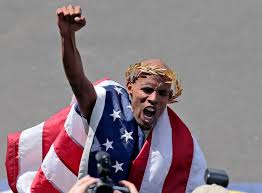
April 15, 2013 witnessed one of the worst terrorist events in American history. The celebration of the 117th Boston Marathon was shattered by two pressure cooker bombs set off by two subhuman losers. 260 people were seriously wounded and three spectators died including seven year old Martin Richards. The citizens of Boston managed to rally and people from across the world vowed to attend the following year’s Marathon in order to pay tribute to the bombing’s victims.
Meb
A stalwart member of the world’s marathon community was moved by Martin Richards’ death and made plans to participate in the 2014 event. Thirty-eight -year- old Meb Keflezighi was ten years removed from winning an Olympic silver medal. It had been five years since he had become the first American to win the New York City Marathon in nearly three decades. But win or lose, he wanted to participate in Boston’s healing.
Meb’s journey to marathon greatness is the stuff from which movies are made. His family was forced to flee war-torn Eritrea for sanctuary in San Diego when Meb was eleven. One of ten children, he became an All-American runner at UCLA and became a naturalized citizen at age 22.
Meb arrived in Boston several days before the 2014 Marathon and had an emotional meeting with Martin Richard’s parents. He privately decided he was going to try to win the race even though he knew his best running days were behind him.
Wearing a bib on which he had written the names of the 2013 Marathon murder victims, Meb stepped to the starting line in Hopkinton. As a rule, elite long distance runners form a pack for at least the first thirteen miles of a marathon. Thus the pack was surprised when Meb and Josphat Boit started pulling away at mile ten and were shocked when Meb dropped Boit at mile fifteen.
Meb’s brother and manager, Hawi observed , “I’ve seen so many marathons where, when you have a pack of runners chasing one person . . . the chances that someone from that pack catches the leader is almost 99 percent.” The pack assumed that Meb would burn out but Meb thought “They’re making the biggest mistake of their lives”. ’
There was widespread concern that the 2014 crowd would be understandably somber. Luckily for Meb, the crowd was more joyous than ever and provided enormous inspiration. Still, with one mile left, Meb was being closely chased by Wilson Chebet. Meb was at his physical and mental limits and almost stopped to vomit. He thought about easing off to save some energy but Meb knew if Chebet caught him, all momentum would be lost. Then, Meb reasoned “He must be hurting. Am I willing to hurt a little bit more? ”
As he made the turn onto the final leg, the devout Christian crossed himself and found one more gear. Meb was attired in red, white, and blue and the crowd started chanting “USA! USA!”. Meb pumped his fists and signed the cross one last time as he passed the site where the first bomb had detonated one year earlier. He held his arms high as he broke the tape.
With an American flag draped around his shoulders Meb climbed the podium to accept the golden wreath. It was the first time in 31 years that an American man had won Boston. The victor wept as the national anthem played.
Healing
Many in the record field of 36,000 had their own poignant story. Some survivors of the 2013 attack who’d lost limbs competed either in wheelchairs or on newly fitted prosthetic legs.
At 2:49 p.m. the moment the first blast had rocked the previous year’s event, the crowd hushed. When the clocked registered 2:50, the crowd erupted in cheers.
Meb Keflezighi retired from competitive marathoning in 2017 but he returned to Boston this past month, wearing bib number 2014 to commemorate the year of his historic victory. He finished 2024’s race in a terrestrial 3:08.
Along with the courageous survivors of the 2013 attack, Meb will always be remembered for turning one of Boston’s darkest days into one of its most joyous.
Have a great weekend.